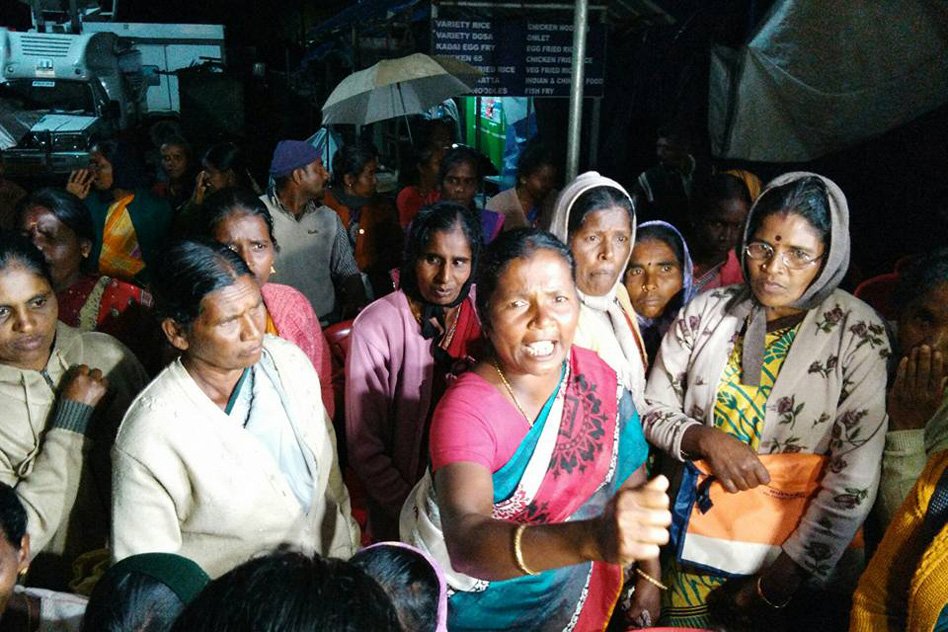Reported By Jeemon Jacob | Originally published on catchnews | Photo: Amirtharaj Stephen
The stir
- Women tea plantation workers are protesting in Munnar, Kerala
- They want their daily wage hiked to Rs 500, planters won’t agree
- The women live in tin sheds, can’t send children to school
The stirring
- The protest has exposed the corrupt plantation trade union leaders
- The protest had ‘put an end to male dominance in union leadership’
- CM has revised the daily wage to Rs 500, but planters say they won’t pay it
For over a month now, the rolling hills of Munnar, Kerala, have been bristling with rage.
Reason: its women tea plantation workers are striking for better wages. They want the minimum wage raised from Rs 231 per 12-hour day to Rs 500, but the planters refuse to concede the demand.
Whether the protest will yield economic gains remains to be seen, but this is clear: these poor workers have struck a big blow for the cause of women’s self-empowerment and dignity. They have also loosened the patriarchal hold on the right of collective bargaining.
As a result of the strike, Kerala’s plantation industry is facing a crisis like never before. Until now, the planters had managed to run the estates smoothly, in large part because they had bought most of the trade union leaders.
But while the union leaders enjoyed their purses and privileges, the women workers were condemned to near bonded labour. They lived in tin sheds without toilets, their children dropped out of school, their men died from alcoholism or cancer. Nobody bothered.
Feeding off the weak
The plantation union leaders, cutting across parties, thrived. Some became MLAs while others were content with the hefty amounts they got for doing the bidding of employers such as Kannan Devan Hill Plantation Ltd and Harrison Plantation Ltd, the largest of the 50-odd planters in Kerala. The long years of treachery by the unions, which claimed to represent their interests, sowed discontent among the workers. They seethed, and quietly started organising.
On 1 September, unknown to the planters or the union leaders, they formed Pempilai Orumai, or the women workers solidarity, to channel their resentment. That same day, they walked into Munnar town and sat on the roads to launch their silent protest. The demonstration grew ever larger as women from different estates spread over 2. 5 million hectares flocked to Munnar.
The Munnar protest has put an end to male dominance in union leadership, says N K Premachandran
Caught unawares, the planters tried to pacify them through union leaders, but the women didn’t allow them near the protest. When S Rajendran, a former union leader who is now the CPI(M) legislator from Munnar, visited them, the women attacked him with sandals. He had to be rescued by the police.
They didn’t spare politicians or the planters either but it was the “treacherous” union leaders for whom they reserved their choicest slogans.
“We toil the whole day, you loot us”
“We carry tea leaves in our baskets; you carry money in your baskets”
“We live in tin sheds, you enjoy bungalows”
The slogans were a compelling commentary on the sad fate of workers in what was once the heart of trade union militancy. And they rang, loud and wide.
Sending a Clear Message
The leader of opposition and veteran communist leader VS Achuthanandan pledged his support to the protestors. He visited Munnar on 13 September to thumping applause and sat with the women for a day.
Sensing that the protest was gathering momentum, Chief Minister Oommen Chandy, on 13 September, revised the state’s daily wage to Rs 500 and announced an economic package for Munnar. The planters, however, refused to pay the revised wages or pay a 20% bonus demanded by the workers.
Meanwhile, feeling left out, the unions too announced a strike on 1 October, demanding a Rs 500 daily wage. They soon started negotiating with the planters, but refused to take along leaders of Pempilai Orumai. The women, they argued, were not part of the Plantation Labour Committee, which comprises union leaders and planters, so they hence could not attend the discussions.
The committee has since held several rounds of talks but has failed to break the impasse. The planters unanimously oppose the wage revision, claiming it would make the plantation industry unviable in Kerala. They have told the government they would much rather close down the plantations than increase the wages.
The committee is meeting again next week to try and work out a solution. In the meantime, the workers, of both Pempilai Orumani as well as the unions, have intensified the strike, closing down all shops and blockading roads in Munnar. The town has come to a standstill.
“The Munnar protest has revealed the weakness in trade union activism,” said RSP leader N K Premachandran. “It has taught trade unions to provide women more forums to air their views. It has put an end to male dominance in trade union leadership.”
Premachandran cautioned, however, that planters could use Pempilai Orumai to undermine the trade unions.
The movement denounced such criticism. “We are not puppets. We know what we want,” Lissy Sunny told Catch. “We have nothing to lose. Hunger and suffering are part of our lives. We don’t care even if we starve to death. But we won’t allow anyone to exploit us. Enough is enough.”
Sunny, 46, has worked on plantations for nearly 23 years. A matriculate, she is now a prominent leader of Pempilai Orumai, voicing the workers’ demands with clarity.
“We were forced to stage the protest just to save our lives,” Sunny said. “We worked 12 hours but we had nothing, not even good food. We lived worse lives than cattle.”
And they are in no mood to give up. “The planters stand to lose more than us,” said another leader Rajeswari, 48, “We have nothing to lose; we are already in peril.”
These women work for a huge plantation company, Kanan Devan Hills Plantations, which is part-owned and largely controlled by the Indian multinational, Tata, the owner of Tetley Tea.
– Jeemon Jacob, www.catchnews.com











